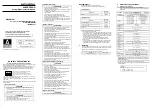
DATA Subsystem
l
The SOURce keyword is ignored for this command.
l
If you wish to have a 3 DAC count signal on channel 1 and a 4 DAC count signal on channel 2, the AABB format
would dictate that the data must be sent as 3, 3, 3, 3, 3, 3, 3, 3, 4, 4, 4, 4, 4, 4, 4, 4. The ABAB format would dic-
tate the order 3, 4, 3, 4, 3, 4, 3, 4, 3, 4, 3, 4, 3, 4, 3, 4.
[SOURce[1|2]:]DATA:ARBitrary[1|2] <
arb_name
>, {<
binary_block
> | <
value
>,
<
value
>, . . .}
[SOURce[1|2]:]DATA:ARBitrary[1|2]:DAC <
arb_name
>, {<
binary_block
> | <
value
>,
<
value
>, . . .}
Downloads integer values representing DAC codes (DATA:ARBitrary[1|2]:DAC) or floating point values (DATA:A-
RBitrary[1|2]) into waveform volatile memory as either a list of comma separated values or binary block of data.
The optional [1|2] after the ARBitrary keyword indicates whether the data to be down-
loaded contains one (default) or two channels of data.
To use dual arbitrary waveform files (single files containing two channels of arbitrary
waveform data), you must have the
.)
Parameter
Typical Return
<
arb_name
> An unquoted string of up to 12 characters.
(none)
<
binary_block
> integer values from -32767 to +32767 or floating
point values from -1.0 to +1.0 in Definite Length Arbitrary Block for-
mat (details below). From 8 to 1M or 16M samples per waveform,
depending on the model and options
.
Definite-length block data allows any type of device-dependent data
to be transmitted as a series of 8-bit binary data bytes. This is par-
ticularly useful for transferring large quantities of data or 8-bit
extended ASCII codes.
188
Agilent 33500 Series Operating and Service Guide
















































